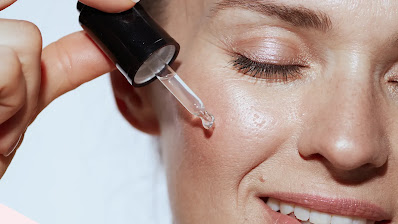Retinol is like the bronzer of skincare. If you apply it too hard, it's obvious you've gone too far, but as long as you hit the right spots, your skin will glow.

However, the biggest obstacle to fully utilizing retinol is the mystery that still surrounds it and other vitamin A derivatives (collectively known as retinoids), and how to survive weeks of sensitivity and irritation while your skin adapts.
But don't let that put you off. With the market for this skin-care ingredient alone estimated to reach $1.5 billion by 2022, retinol is praised by dermatologists for several good reasons.
It's a slick multi-tasking tool that not only fights hyperpigmentation, but also plumps fine lines by accelerating cell turnover and stimulating collagen production. It can even help treat cystic acne and blemishes. So this is definitely worth looking into.
Aesthetic doctor Dr. Ewoma Ukeleghe is a true retinoid expert. "They treat a range of skin concerns, from acne, to roughness and dullness, to minimize pores and aging. It really does it all."
Plastic surgeon and founder of 111Skin. Yannis Alexandrides believes that a vitamin A serum or cream should be an integral part of your daily routine. “For skin to be healthy, it needs to have vitamin A.
Retinol is an ingredient that can be used all the time because it continues to work,” he points out. To help you out, we've put together a simple guide on how to best use retinol. Here you will find everything you need to know.
What is retinol? Retinol is a form of vitamin A, a key vitamin in the body that promotes cell renewal. The retinol market is expected to reach 1.5 billion by 2022, with 7.2 billion views on Tiktok as a search term.
It belongs to the retinoid family—all different types of vitamin A that come in different concentrations and work in slightly different ways in the skin.
Retinoic acid (also known as Retin-A or tretinoin) is the most powerful retinoid. According to cosmetic dermatologist Dr. Sam Bunting, "It penetrates the skin cells and works immediately because it activates the retinoid receptor gene."
Our skin also naturally contains retinoic acid, so this This form of vitamin A is "bioavailable," meaning it does not need to be converted into our skin cells to function. Other retinoids, from strongest to weakest, include retinaldehyde, retinol, and then retinyl esters (such as retinyl palmitate).
Once they reach our skin, our cells have to convert them into retinoic acid, a process that also makes them "less effective," says Dr. Bunting. What are the benefits of retinol? Retinol can reduce fine lines, treat acne, reduce hyperpigmentation, unclog pores, reveal brighter skin—basically, it does a lot of things.
Watch More Image Part 2 >>>
Retinoids work by increasing cell turnover. In other words, it exfoliates the skin, increases collagen production, and stimulates the skin's self-renewal—which helps achieve all of the above.
Retinol for Acne Treatment. "Retinol is great for congested or acne-prone skin because it clears bacteria from pores and reduces sebum production," says Dr. Alexander.
Retinol Treats Acne Scars. Acne scars occur due to injury to the skin and the body's natural wound healing response, sometimes resulting in uneven skin texture and pink or dark patches. Retinols and retinoids improve the appearance of dimples and discoloration by hurried cell turnover and boosting collagen production.
Retinol for pigmentation. These dark clover-shaped spots on the skin are the result of excess melanin (pigment) building up on the skin due to sun damage or inflammation. "We know that retinol slows melanin production and therefore is beneficial for pigmentation," notes Dr. Alexander.
Retinol anti-wrinkle. As we age, our skin changes its behavior. The rate at which fresh skin cells come to the surface slows down; the skin struggles to retain moisture, and elastin and collagen (the source and filler of the skin) begin to break down.
"Retinol is the best because it rewards the skin, makes it thicker and tighter," adds Dr. Alexander added. Which tretinoin is right for me? When it comes to retinoids, there are three things to consider. Form (e.g., retinol vs. retinyl ester), concentration, and method of administration.
Retinoid: A powerful retinoid prescribed by dermatologists to treat acne, hyperpigmentation, and signs of aging. It's about 20 times more powerful than retinol and contains retinoic acid, so unlike over-the-counter retinoids, it doesn't need to be converted into retinoic acid through a skin reaction.
Retinal/Retinaldehyde: The second strongest retinoid. Retinaldehyde is just one step away from retinoic acid, says Dr. Bunting, which has the same anti-aging benefits as retinol, but faster (up to 11 times) and less irritating. Retinal is also the only vitamin A with antibacterial properties, making it ideal for oily or blemish-prone skin.
Tags:
Skin Care
